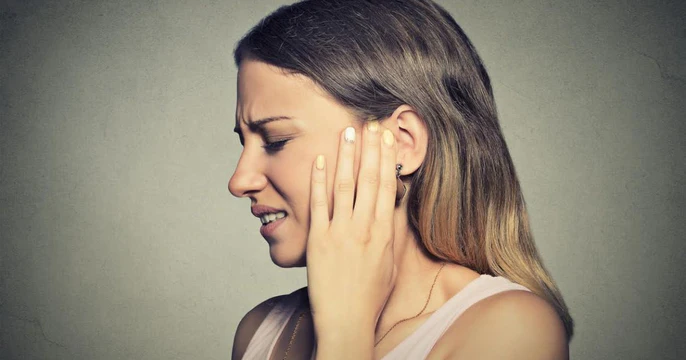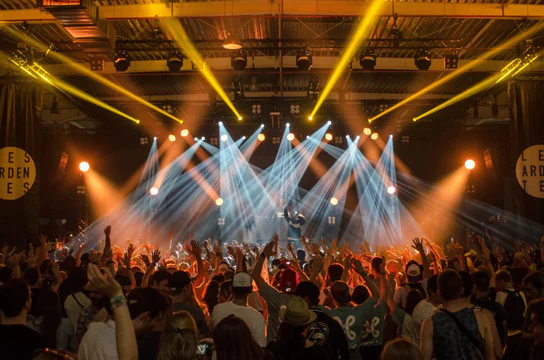It’s Friday, 9pm, and the night is just getting started. You’re ready to enjoy some dancing with your friends. You walk into the nightclub of your choice (with your wristband and hand stamped of course) and you see colored lights flashing to the beat.
Dancers are heating up the dance floor. You feel the bass in your chest. The music invites you to move.
Have you ever wondered why a loud club or rock concert is so much fun? Or ever asked yourself “why do I like loud music?”. Luckily, we’re here with the answers. Let’s dive right in.

Why do people like loud music so much?
It’s no secret that loud music can cause us problems, including tinnitus, hearing damage, and even hearing loss. But we still find ourselves blasting out tunes as we wait in traffic, heading to the club or rocking out to live music at concerts.
So, why do we do it? What is it about listening to loud music that makes us feel so alive?
1. Loud music relieves stress
The sacculus (pronounced as sack-you-less) can be found in the inner ear. It’s special because it has direct connections to pleasure centers in the brain. It releases endorphins when stimulated by loud music, so listening to loud music is essentially self-medicating.
The sacculus particularly likes low frequencies (bass, basically) above 90 decibels, according to the research of Dr Neil Todd. Funnily enough, at one point in time it was believed that the sacculus had no real purpose. Little did they know that it’s responsible for the joy we find in music!
2. Songs sound better when they’re played loud
There’s so much music and so many songs out there. A lot of these reach a level of complexity that just cannot be appreciated at low volumes. Simply put, when playing loud music, the details become easier to pick up.
Usually, being able to hear more details and picking up different sounds means the music sounds better. After all, that’s how the artist created it – all little details included.
This is part of the reason many audio engineers and people mastering songs have tinnitus. After years of wearing high-end headphones and blasting songs at an increased volume to make sure the mix is just right, they have permanent hearing damage.
3. Music evokes emotions
Getting chills when listening to music is called frisson (pronounced like free-son) and it happens when dopamine floods the body. People who react to music have strong connections between the part of the brain that interprets sound and the part that creates emotion.
Valorie Salimpoor, a neuroscientist at McGill University, conducted research where the subject was hooked up to a fMRI machine while listening to music. It was shown that our brains release dopamine at peak moments in the song. And that’s not all. She also discovered that, when listening to songs we already know, the anticipation of peak moments triggered dopamine release as well.
Combine these two factors, and you know why you feel so emotional (be it euphoria or sadness) when listening to music you love.

4. (Loud) music blocks out the world
You know those moments when you’re driving, and as soon as you are close to your destination or looking for a parking spot, you turn the music down? Exactly. It’s like you cannot focus on other things when listening to loud music. This is (partially) true!
Loud music takes over the brain: it overwhelms the other senses in a way that is similar to alcohol or drugs. It becomes all-consuming. Sometimes, blocking out the world and just enjoying the emotions of the music is a much-needed experience.
5. Loud music is a stimulant
You can compare it to other stimulants like caffeine, cocaine, alcohol, and exercise. It increases the heart rate and body temperature. Loud music has even been proven to speed up a runner on a treadmill!
Walk into any gym and take a look around. There’s probably a lot of people working out while listening to music – because it actually helps!
6. It can improve your productivity
Well, sort of. If you need to focus on a particularly important or intricate task, then music may not be the best choice. In fact, it could even make you feel frustrated and unproductive.
But, if you’re working on a mindless task or something you could do with your eyes closed, cranking up the music could give you the burst of energy you need to get the job done.
And we’re not just talking about your productivity at work. Have you ever noticed that your spring cleaning is a lot faster – and more enjoyable – when you’re playing loud music and singing along at the top of your lungs? Before you know it, your whole bathroom is sparkling and you’ve started on the kitchen.
7. Loud music can get your creative juices flowing
Music and art go hand in hand. We can all picture it: the tortured artist, throwing paint at a canvas while heavy metal blasts in the background.
And it’s true, at least for some people, that very loud music can help them to be more creative. One study even found that listening to happy music resulted in higher levels of creativity than in the participants who completed the task set in silence.

8. It makes us feel good
In 2017, researchers set out to find out why people expose themselves to loud music even though – spoiler alert – it can cause long-term hearing damage.
Respondents spoke positively of how loud music made them feel, using words like:
- positive
- happier
- upbeat
- enthusiastic
- energized
- alive
It was also found that hearing loud sounds that were previously associated with positive experiences would trigger the same positive emotions. So, if you have good memories of dancing the night away to a particular song with your best friends on holiday, hearing that song again will bring all of those feelings rushing back. It was also thought that the loudness of the music enhanced any feelings associated with it.
So, the louder the music, the better you feel. And you’re more likely to turn up the volume even louder so you can soak up all the good vibes.
9. It’s fun!
Heading to a festival with friends. Dancing the night away in a club. Listening to your favorite band play your favorite song live. There’s nothing quite like it.
One of the main reasons that people can’t get enough loudness when it comes to music is simply because it’s fun. It’s fun to immerse yourself in an experience. It’s fun to lose yourself and let the sound wash over you. It’s fun to share music with likeminded people. Lots of us listen to music as loud as we can purely for the love of it.
Are there any downsides to listening to loud music?
Just like almost everything, too much of a good thing can be dangerous. Unlike some other dangerous substances though, it takes years of “abuse” to notice the damage. Loud music gives you a dopamine hit, so it can be good for the brain – but it can be bad for your ears.
Compared to the pleasures of loud music, the danger of hearing loss may feel like a distant risk.
There is also the misconception that loud music will cause no damage unless it’s painful, which tends to be in the range of 120-140 decibels. But hearing loss can happen when the decibels levels are low – even as low as 85, especially when the exposure to this amplitude is constant.
Clubs tend to blast music louder than 115 decibels (a normal lawnmower is 100 decibels). People can experience significant damage listening to this level for eight hours. This may cause a ringing in your ears, even when you’re not standing next to the speaker. And not just for a day, if you’re not careful the ringing could be for life.
Listening to loud music on the regular can damage your hearing. Even if you’re not going to concerts every day, you could still be putting yourself at risk by blasting music through your earbuds.
We get it, though. It can be hard to quit listening to loud music. And it’s no wonder, given that one study found that traits of addictive-like behavior to loud music were more commonly detected in members of nonprofessional rock and pop bands than in control subjects.
If you love listening to loud music through your earbuds, consider turning it down a notch or two. You can still get the feel-good factor while reducing the risk of hearing damage. If you don’t want to turn it down, then at least try to take breaks. It’s not just the loudness of sounds that can cause hearing damage, but also how long you’re exposed to the sound for.
And if you love attending festivals, concerts and other live music events? Well, it’s important to protect your ears so you can keep enjoying music for life. The best way to do that? Earplugs. When you wear earplugs that are specifically designed for concerts, like the Loop Experience Plus, you’ll get the full experience of loud and clear music. That’s because they’re designed to filter sound rather than muffle it, with up to 18 decibels of sound protection – plus an extra 5 db when you use the Loop Mute accessory.
That means you don’t need to miss out on the experiences you love for the sake of your hearing. Win-win all round!

How to Stop Ringing Ears After a Concert
If you’ve landed on this article, there’s a pretty good chance you’re hearing a ringing in your ears while reading th...

Concert ready: Tips for first-time concertgoers
Get ready for an unforgettable experience! Learn valuable tips and tricks for first-time concert goers to make the mo...

Unveiling the Top 5 Causes of Tinnitus
Discover the top 5 causes of tinnitus and gain insights into why your ears ring. Expert advice for identifying trigge...












